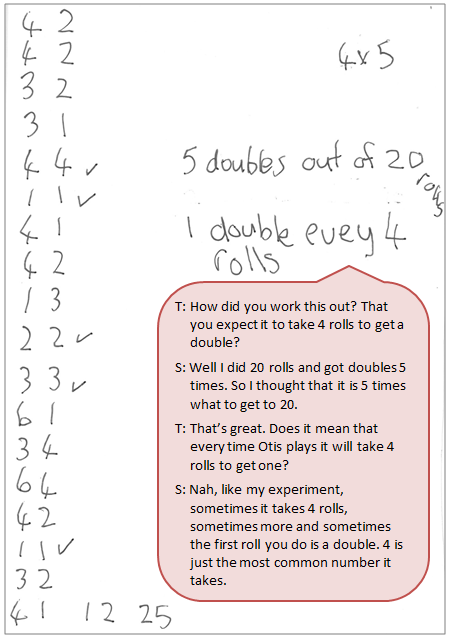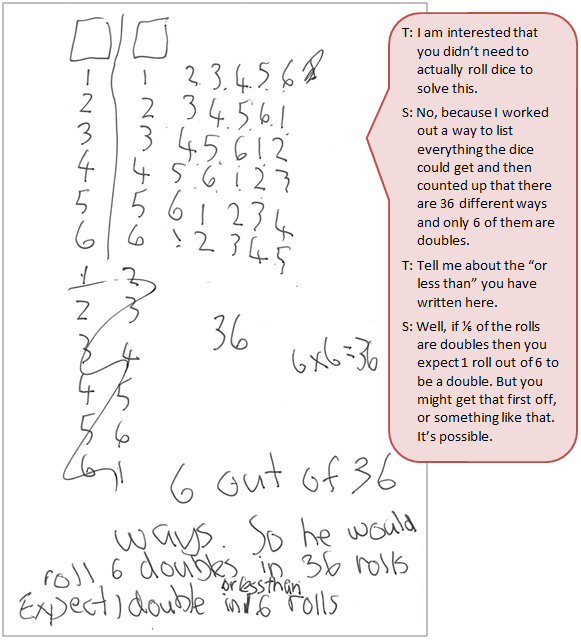The purpose of this activity is to engage students in finding an expected number that is based on equally likely outcomes.
This activity assumes the students have experience in the following areas:
- Using the language of probability to express the likelihood of an event occurring.
- Recognising when outcomes are equally likely.
- Trialling simple experiments with coins and dice.
- Finding all the possible outcomes for simple chance situations.
The problem is sufficiently open ended to allow the students freedom of choice in their approach. It may be scaffolded with guidance that leads to a solution, and/or the students might be given the opportunity to solve the problem independently.
The example responses at the end of the resource give an indication of the kind of response to expect from students who approach the problem in particular ways.


Playing a board game, Otis needs to roll doubles in order to start.
How many turns do you expect it will take before Otis gets to start?
The following prompts illustrate how this activity can be structured around the phases of the Mathematics Investigation Cycle.
Make sense
Introduce the problem. Allow students time to read it and discuss in pairs or small groups.
- Do I understand the meaning of rolling a double? (Students will benefit from rolling two dice themselves a few times.)
- What does the word ”expect” mean in this problem? (Expectation is about thinking ahead about a situation before it happens.)
- What will an answer to the problem look like? (The answer should give a prediction of how many rolls will be needed to get a double. It must be accompanied by results of a trial and/or a model of all possible outcomes.)
Plan approach
Discuss ideas about how to solve the problem. Emphasise that, in the planning phase, you want students to say how they would solve the problem, not to actually solve it.
- How can you find out the chances of getting a double when rolling two dice?
- How many rolls do you need to do before you have some idea of how often a double happens?
- Are there ways to find all the things that might happen when you roll two dice?
- How could you find all the possible outcomes? How would that help you to solve the problem?
Take action
Allow students time to work through their strategy and find a solution to the problem.
- Am I recording the results of the trials in an organised way?
- Have I played dice rolls, or do I need to play more? Why?
- What strategy did I use to find all the possible outcomes? (A table, tree diagram, or organised list are useful tools.)
- Do the results of the rolls match my thinking? Why do the results vary from my predictions?
- How can I record what happened using numbers, especially fractions or percentages.
Convince yourself and others
Allow students time to check their answers and then either have them pair share with other groups or ask for volunteers to share their solution with the class.
- What is my answer? Does my answer show how many rolls Otis will need?
- How would I convince someone else that my answer makes sense?
- Is my answer certain or might the number of rolls vary? Why?
- Do the trail results and possible outcome match? Why might that happen?
- What have I learned about probability by solving this problem?
Examples of work
Work sample 1
The student conducts 20 trials and speculates about the number of rolls required based on the results. They accept that there will be variation in the number of rolls required each time to get a double.
Click on the image to enlarge it. Click again to close.
Work sample 2
The student creates a table to find all the possible outfcomes for a two dice throw. They calcualte that a double should happen every six throws.

